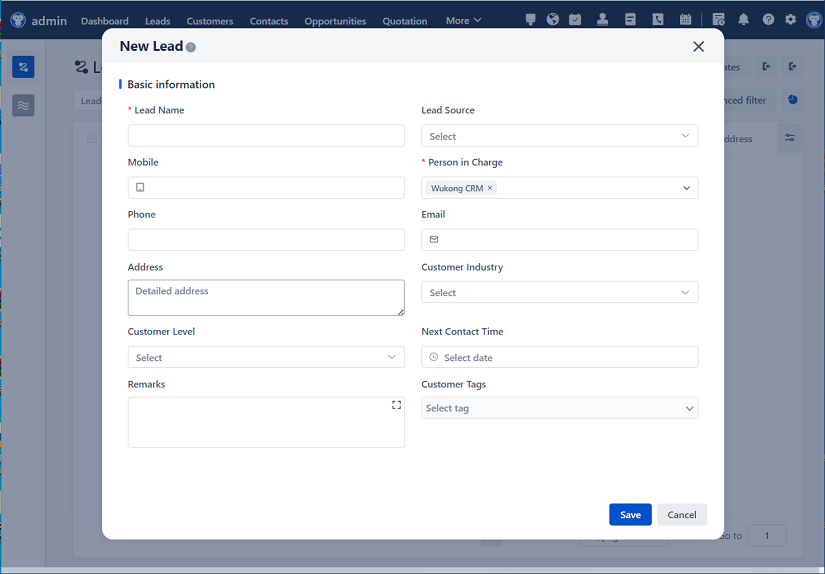
△Click on the top right corner to try Wukong CRM for free
You know, when you think about the pharmaceutical industry, it’s easy to picture scientists in labs, white coats, test tubes, and breakthrough discoveries. And sure, that’s a big part of it. But here’s something people don’t talk about nearly enough — how important relationships are in this whole process. I mean, think about it: even the most revolutionary drug won’t go far if doctors don’t trust it, hospitals don’t adopt it, or patients don’t understand how to use it. That’s where customer relationship management — or CRM — comes in. And honestly, it’s kind of a game-changer for pharma companies.
Now, I know what you might be thinking — “Wait, CRM? Isn’t that just for sales teams in retail or tech?” And yeah, that’s where it started. But over the years, CRM systems have evolved. They’re not just about tracking leads or managing email campaigns anymore. In the pharmaceutical world, CRM is way more nuanced. It’s about building trust with healthcare professionals (HCPs), understanding their needs, and making sure they have the right information at the right time. It’s not pushy sales; it’s more like being a helpful partner.
Let me give you an example. Imagine a pharmaceutical rep visiting a cardiologist. Without a CRM, they might just hand over a brochure and hope for the best. But with a CRM system in place, that rep can pull up the doctor’s past interactions — what drugs they’ve shown interest in, which clinical trials they’ve participated in, even their preferred method of communication. That means the conversation becomes way more personalized. Instead of a generic pitch, it’s a real dialogue. And honestly, doctors appreciate that. They’re busy, they’re skeptical, and they don’t have time for fluff.
And it’s not just about reps in the field. CRM systems help centralize data across departments — marketing, medical affairs, compliance, even patient support programs. So when the marketing team wants to launch a new campaign, they’re not working in the dark. They can see what messaging resonated before, which HCPs engaged the most, and what kind of content actually got read. That kind of insight? It’s gold.
But here’s the thing — pharma CRM isn’t like CRM in other industries. There are way more regulations. You can’t just email a doctor every day with promotional material. There are strict rules around what you can say, when you can say it, and how you track consent. That’s why a good CRM system for pharma has to be compliant out of the box — things like GDPR, HIPAA, and local regulations like the Sunshine Act in the U.S. It’s not optional. One misstep, and you could be facing fines or worse, losing trust with your customers.
I remember talking to a compliance officer at a mid-sized pharma company, and she told me, “Our CRM isn’t just a sales tool — it’s our legal safeguard.” That really stuck with me. Every interaction, every email, every meeting gets logged with timestamps and approvals. It’s not about spying on people; it’s about accountability. And honestly, that level of transparency builds trust — both internally and externally.
Another thing people don’t always realize is how much data pharma companies actually collect. It’s not just names and email addresses. We’re talking about prescribing patterns, conference attendance, digital engagement with educational content, even feedback from advisory boards. A CRM pulls all that together into one place. So instead of guessing what a doctor might need, you can actually anticipate it. For example, if a physician recently attended a webinar on diabetes management, the CRM can trigger a follow-up with relevant clinical data or invite them to a speaker program. It’s proactive, not reactive.

And let’s not forget about the patient side of things. Sure, pharma companies don’t usually interact directly with patients — that’s more the job of healthcare providers. But CRM systems are starting to support patient support programs too. Think about specialty drugs for rare diseases. These treatments often come with complex dosing, side effects, and insurance hurdles. A CRM can help track which patients are enrolled in support services, send reminders for refills, and even flag when someone might be struggling with adherence. It’s not just good for patients — it improves outcomes, which in turn makes the drug look better in real-world evidence.
Now, I’ll be honest — implementing a CRM in pharma isn’t always smooth sailing. I’ve heard stories from companies that tried to roll one out and ran into all kinds of issues. Like, the sales team refuses to use it because it’s too clunky. Or the IT department says it doesn’t integrate with their existing systems. Or — and this one’s big — the medical affairs team is worried about compliance risks. So yeah, it takes more than just buying software. You need buy-in from leadership, training for users, and a clear strategy for how it fits into your overall commercial model.
But when it works? It’s amazing. One company I read about saw a 30% increase in HCP engagement after switching to a modern CRM. Another reported that their field reps were spending 40% less time on admin and 60% more time on actual customer interactions. That’s huge. Because at the end of the day, pharma isn’t just about molecules — it’s about people. And the better you understand those people, the better you can serve them.

Another cool thing about modern CRM systems is how they use AI and analytics. I mean, we’re not talking about robots taking over — but smart tools that help humans do their jobs better. For example, some CRMs can predict which HCPs are most likely to prescribe a new drug based on their past behavior. Others use natural language processing to analyze call notes and identify emerging concerns or questions. It’s like having a co-pilot who’s always paying attention.
And let’s talk about omnichannel engagement. Patients and doctors don’t just interact through face-to-face meetings anymore. They’re on websites, mobile apps, webinars, social media (well, professionally, at least), and email. A good CRM helps pharma companies meet them where they are. So if a doctor prefers to get updates through a secure portal, great. If another likes in-person meetings but only on certain days, the CRM can schedule accordingly. It’s about respecting preferences — which, by the way, makes people way more likely to engage.
I also think it’s worth mentioning how CRM supports collaboration across global teams. Big pharma companies operate in dozens of countries, each with its own regulations, languages, and market dynamics. A centralized CRM with regional customization lets teams share insights without violating local rules. For example, the U.S. team might learn from a successful campaign in Germany and adapt it — legally and ethically — for their market. That kind of knowledge sharing used to take months. Now, it can happen in real time.
Of course, none of this works if the data is messy or outdated. Garbage in, garbage out — you’ve probably heard that before. That’s why data hygiene is so important. Regular cleanups, deduplication, validation — it’s not glamorous, but it’s essential. And honestly, it’s something many companies overlook until they’re trying to run a report and realize half the contacts are invalid.
Another challenge? Change management. I’ve seen companies spend millions on a CRM only to have low adoption because they didn’t train people properly. Or worse, they forced everyone into the same workflow, even though a medical science liaison has different needs than a sales rep. The best implementations I’ve seen are the ones that start small — pilot with one team, gather feedback, tweak the system, then scale. It takes patience, but it pays off.
And let’s not forget the patient journey. While CRM in pharma has traditionally focused on HCPs, there’s a growing push to include patient-centric metrics. Things like time to therapy initiation, support program utilization, and satisfaction scores. Some forward-thinking companies are even linking CRM data with real-world evidence platforms to show how engagement impacts outcomes. That’s the future — not just selling drugs, but improving health.
Look, I get it — CRM might sound like just another tech buzzword. But in pharma, it’s more than that. It’s about building relationships in a highly regulated, complex, and human-driven industry. It’s about respecting the time and expertise of healthcare professionals. It’s about getting life-saving treatments to the right patients at the right time. And yeah, it’s also about staying competitive in a market where trust is everything.
So if you’re in pharma and you’re not using a CRM — or you’re using one that’s outdated — now’s the time to rethink it. Not because it’s trendy, but because it works. Because your reps deserve better tools. Because doctors deserve better conversations. And because patients deserve better outcomes.
At the end of the day, medicine is personal. And CRM, when done right, helps keep it that way.
FAQs (Frequently Asked Questions):
Q: Isn’t CRM just for sales? Why do pharma companies need it?
A: Great question. While CRM started in sales, in pharma it’s much broader. It helps manage relationships with doctors, track compliance, support patient programs, and align teams — way beyond just selling.
Q: Can CRM systems handle strict pharma regulations?
Absolutely. Modern pharma CRMs are built with compliance in mind — things like audit trails, consent management, and data encryption. They actually help companies stay within legal boundaries.

Q: Do doctors actually care if pharma companies use CRM?
You’d be surprised. Doctors notice when interactions are relevant and respectful of their time. A good CRM helps reps provide value, not just promotions — and that builds trust.
Q: Is CRM only for big pharma companies?
Not at all. Smaller and mid-sized companies benefit too — sometimes even more, because they need to be efficient and targeted with limited resources.
Q: Can CRM improve patient outcomes?
Indirectly, yes. By helping HCPs make informed decisions and supporting patient adherence programs, CRM contributes to better treatment journeys and real-world results.
Q: What’s the biggest mistake companies make with CRM in pharma?
Probably treating it as just a software purchase. Success comes from strategy, training, and cross-functional alignment — not just the tech itself.
Q: How does AI fit into pharma CRM?
AI helps analyze data to predict engagement, personalize content, and automate routine tasks — so teams can focus on high-value interactions.
Q: Can CRM integrate with other systems like ERP or clinical databases?
Yes, most modern CRMs offer APIs and integration tools to connect with other enterprise systems — as long as data privacy and compliance are maintained.
Related links:
Free trial of CRM
Understand CRM software
AI CRM Systems

△Click on the top right corner to try Wukong CRM for free